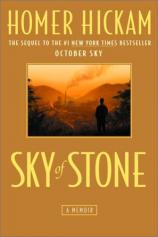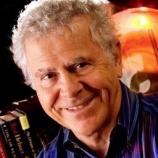Reading Group Guide
Discussion Questions
Sky of Stone: A Memoir

1. As you read this memoir, did you begin to feel as if you knew the people involved? Did you like them? Do you think you'd have been happy to live in Coalwood in the early 1960's? If you had, what position in it would you have wanted? Coal miner? Foreman? Teacher? Housewife? Preacher? Doctor? Commentary: Coalwood had a distinct role for each person who lived there. In order to live in the town, it was required that the head of the household work for the mine in some capacity. The exceptions to this were the teachers at the Coalwood School. Even the preachers were company men!
2. Was this memoir similar in its construction with others that you have read? What do you think of the memoir genre? Do you think it might be hard to write a memoir that is interesting to readers? Commentary: A memoir is, as its title implies, a memory of long-ago events. We suggest a discussion of the current popularity of reading memoirs. Also see www.homerhickam.com and go to "The Rocket Boys" and "Coalwood" buttons for photos and biographies of the real people in the book.
3. How would you describe this book? Would you call it a man's book or a woman's book? Is it just a story of a boy with a dream or the story of a small mining town? Or is it something grander and deeper? Commentary: Homer 's Coalwood books are a weaving of many allegorical themes that begin loosely connected but are gradually wound tighter and tighter until they become as one. Can you spot those themes? Homer gets lots of glowing fan mail from "reluctant readers" who has one of his books recommended to them, but thought they wouldn_t be interested, then they stayed up all night reading it.
4. How would you describe Sonny's parents? Do you think Homer (Senior) and Elsie love each other? How do they display their love? Why to they fight? Why did Elsie leave Coalwood and why did Homer (Senior) stay behind? Who, in the end, wins their battle? Commentary: Homer (Junior) believes that the core to all his Coalwood memoirs is the conflict between his parents.
5. Why did Sonny feel responsible for the American effort to go to the moon? Do you think his brief encounter with JFK was enough to cause the Apollo program? Commentary: In later years during Homer's career with NASA, he liked to tell the engineers and astronauts who worked on the Apollo program that they would have never gone anywhere had it not been for him talking to JFK. He readily admits, however, that "Wernher von Braun had a lot more to do with it."
6. Why did Coalwood keep the Secret Man secret? What would have happened if they hadn't? Was it the best thing for Nate to be a Secret Man? How about Mrs. Dooley? Was it best for her to stay in Coalwood? Do you think it was right for Sonny's mom to insist that Sonny owed his life to Nate? Commentary: The mining towns in southern West Virginia had a tradition of "secret men," miners so physically damaged by the mine they could do little real work but kept on the payroll.
7. What do you think Sonny's mom was up to when she sent Sonny back to Coalwood? Do you think his father knew everything that was going on or was he also being manipulated by Elsie? Do you admire Elsie? Homer (Senior)? Sonny? Commentary: Homer's mom is a healthy 89-year old now, living in Myrtle Beach, South Carolina. She hasn't changed much. She's still always up to something!
8. What do you think Mr. Dubonnet's motive was in offering Sonny a job? Was he just trying to needle Homer (Sr.)? Or was he trying to help Sonny become a man? Or was there another reason? Commentary: In the first two books in the series, it's pretty clear there's an attraction between John Dubonnet and Elsie and they had a history, although it's never spelled all the way out.
9. Did you like the chapter when Sonny worked with Big Jeb? Why do you think Big Jeb stuck with Sonny all the way to the Club House? Big Jeb seems to like Sonny at the end. Why do you think that was? Just because Sonny had worked so hard? Or do you believe there was another reason? Commentary: Big Jeb represents the legendary status some of the miners had with the children of Coalwood. Homer (Jr.) says he never had any interaction with Big Jeb until the day he worked with him in the mine although he'd heard nearly everything about him while growing up.
10. Why did Homer (Sr.) want Sonny to quit the mine? Do you think the father was too harsh with the son when it was obvious he was being manipulated by Elsie and Mr. Dubonnet? Why do you think Sonny's father seems to have trouble relating to his second son? Commentary: This is one of those underlying themes to the book, that sometimes fathers and sons can never quite communicate even though there is evident love between them. An extension of that theme is it is ok as long as each understands it and hangs onto the love even during the arguments.
11. Why do you think Sonny was assigned to Johnny Basso and Bobby Likens for the summer? Although he was described as conceited, did you like Bobby? Why was he always trying to help Sonny? Was Johnny a good boss? What did he teach the boys? What do you think about Johnny being a "holy-roller?" Commentary: Homer says there was never a better miner than Johnny Basso. When Homer (Sr.) assigned the two college boys to him, however, Johnny took on a tremendous responsibility for their education and safety.
12. Did you like Rita Walicki? Why do you think she felt it was ok to cheat for Sonny? What do you think Rita really thought of Sonny? Was there any chance for them as a couple? Commentary: As Homer's wife, I can tell you two engineers in a family would be one too many!
13. Why did Rita want to go inside the mine so much? Was she a feminist before her time? Or was she simply ambitious? Why do you think miners had the superstition about women in the mine? Was Homer (Sr.) right to try to keep her out because of this superstition? Commentary: Miners were very superstitious about a lot of things. Many would have lucky helmets or shoes or other things they wore. They believed there were ghosts in mine, the spirits of dead miners. They were afraid of the number thirteen. That's why Homer (Sr.) had the number thirteen on his mine tag, to show he wasn't superstitious.
14. When the Reverend Little Richard quoted the proverb: "It is the glory of God to conceal a thing; but the honor of kings to search it out," what was he trying to tell Sonny? Commentary: The Reverend was always a source of great wisdom to Homer (Jr.). Homer looks back now to his conversations with the old preacher with fondness. He only wishes he'd paid more attention!
15. Do you think the way the "testimonies" were held was a fair procedure? Do you think present-day courtroom procedures are more fair? Why do you think Jake arranged it so the entire town could attend? Why do you think Jake agreed to come back to Coalwood? What is the relationship between Jake and Homer (Sr.)? Jake and Sonny? Commentary: Jake Mosby is an important character in all three books. Of all the characters in the books, he probably grows the most.
16. Why did Elsie return to Coalwood? Why did Captain Laird return? Do you admire the Captain? Do you think he did the right thing by creating a Secret Man and hiding the truth of what happened to Elsie's fox? Commentary: Captain Laird remains a legendary character in Coalwood. He had a political philosophy that required the company to be benevolent while also controlling every aspect of the town's life. It seemed to work for a time. In the midst of company-union strife in surrounding towns, Coalwood was a bit of a peaceful, prosperous oasis.
17. Why do you think President Truman agreed to send the navy into Coalwood? Why do you think he liked Mr. Carter and Mr. Carter seemed to like him even though they were enemies? Commentary: There are still many pieces of navy silver in the hands of Coalwood citizens, sneaked to them by the sailors. Although the occupation was hated at the time by the townspeople, they recognized the sailors were just doing their jobs. Many of those sailors found themselves a Coalwood girl and got married. Some came back to work in the mine.
18. Why do you think Johnny missed that final spike? Did he do it intentionally? Do you think there is a controlling destiny for everyone and everything, even for a little bet in a small coal mine in a far-away place like Coalwood? What did Sonny learn because of the bet and what happened? Commentary: The aspects of destiny is one of the underlying themes of the Coalwood memoirs.
19. During the fighting of the forest fire, what implications were evident in the final scene between Sonny and Rita? What did Sonny learn by Rita's kiss? Why do you think Homer (Jr.) ended his book with the fire? What did it say about Coalwood and its people? Commentary: Homer always has in mind a final scene even before he begins to write a book. Although it's tempting to get ahead and write it, he always waits patiently until he gets to the end. It's like a carrot on a stick!
20. The epilogue sums up Homer's life to date. What do you think of that life? Do you think this indicates that Homer will not write any more memoirs? This commentary and discussion questions were written by Linda Terry Hickam, assistant (and wife!) to Homer Hickam. Visit www.homerhickam.com for more information on all of Homer's books, the film "October Sky," the real Rocket Boys, teacher information and lesson plans, photographs, and much more.
Sky of Stone: A Memoir
- Publication Date: October 9, 2001
- Genres: Nonfiction
- Hardcover: 384 pages
- Publisher: Delacorte Press
- ISBN-10: 0385335229
- ISBN-13: 9780385335225








